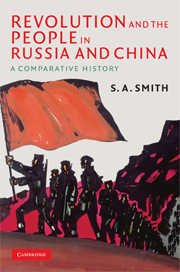Book contents
- Frontmatter
- Contents
- Acknowledgments
- Introduction: Capitalist Modernity and Communist Revolution
- 1 Memories of Home: Native-place Identity in the City
- 2 The Awakening Self: Individuality and Class Consciousness
- 3 After Patriarchy: Gender Identities in the City
- 4 Saving the Nation: National and Class Identities in the City
- 5 Workers and Communist Revolution
- Index
- References
2 - The Awakening Self: Individuality and Class Consciousness
Published online by Cambridge University Press: 05 June 2012
- Frontmatter
- Contents
- Acknowledgments
- Introduction: Capitalist Modernity and Communist Revolution
- 1 Memories of Home: Native-place Identity in the City
- 2 The Awakening Self: Individuality and Class Consciousness
- 3 After Patriarchy: Gender Identities in the City
- 4 Saving the Nation: National and Class Identities in the City
- 5 Workers and Communist Revolution
- Index
- References
Summary
To address the theme of individuality in the context of working-class formation and Communist revolution may seem perverse. Class identity, after all, is usually seen as a form of collectivism, and individualism and collectivism tend to be positioned at opposite ends of a cultural spectrum. And to suggest, as I shall, that a growing sense of individuality was one of the elements that comprised the dynamic compound of changing social identities that made peasants-turned-workers susceptible to revolutionary mobilization – especially in Russia – may seem wide of the mark to those who know that a phobic antipathy to ‘petty-bourgeois individualism’ became a hallmark of Russian and Chinese Communism. Moreover, the apparent incongruity of the theme is heightened when one considers the cultures under investigation: Russian culture appears historically to incarnate a form of collectivism that is extreme by the standards of peasant societies in Europe; while Chinese culture appears to represent a Confucian collectivism that is the antithesis of western individualism. I wish to argue, however, that while it is heuristically useful to situate individualism and collectivism at two ends of a spectrum, the relationship between collectivism and individualism was historically more complex, contingent and mutable than social scientists and philosophers often allow.
Clifford Geertz famously observed that: ‘The Western conception of the person as a bounded, unique, more or less integrated motivational and cognitive universe … is, however incorrigible it seems to us, a rather peculiar idea within the context of the world's cultures.
- Type
- Chapter
- Information
- Revolution and the People in Russia and ChinaA Comparative History, pp. 69 - 110Publisher: Cambridge University PressPrint publication year: 2008

